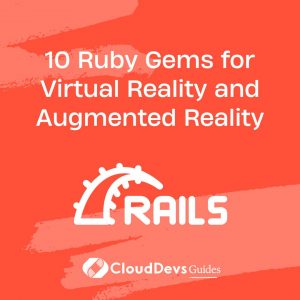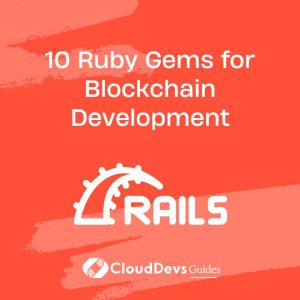10 Ruby Gems for Virtual Reality and Augmented Reality
As virtual reality (VR) and augmented reality (AR) technologies continue to evolve, developers are increasingly seeking ways to create immersive and interactive experiences. Ruby, known for its simplicity and elegance, offers a range of gems that can facilitate VR and AR development. This blog post explores ten essential Ruby gems that can help you build captivating VR and AR applications.
-
`ruby-openvr`
`ruby-openvr` is a Ruby binding for the OpenVR API, enabling developers to interface with VR hardware like HTC Vive and Oculus Rift. This gem provides access to device tracking, input, and rendering functionalities, making it a versatile tool for VR development.
```ruby require openvr vr_system = OpenVR.init if vr_system puts "OpenVR system initialized" else puts "Failed to initialize OpenVR system" end ```
-
`gosu`
`gosu` is a 2D game development library in Ruby. While primarily designed for 2D games, it can be adapted for AR experiences by overlaying graphics on real-world video feeds. Its ease of use and flexibility make it a popular choice for developers.
```ruby
require gosu
class GameWindow < Gosu::Window
def initialize
super 640, 480
self.caption = "AR Example"
@background_image = Gosu::Image.new("media/background.jpg", tileable: true)
end
def draw
@background_image.draw(0, 0, 0)
end
end
window = GameWindow.new
window.show
```
-
`artoo`
`artoo` is a versatile robotics and IoT framework that can be used for AR applications, especially when integrating with hardware devices. It supports a wide range of hardware, including drones, sensors, and more, allowing for rich interactive experiences.
-
`opengl`
For those looking to render 3D graphics, `opengl` provides a Ruby binding to the OpenGL API. This gem is essential for creating complex 3D scenes and animations, which are crucial in VR applications.
```ruby require opengl glBegin(GL_QUADS) glVertex3f(-1.0, -1.0, 0.0) glVertex3f( 1.0, -1.0, 0.0) glVertex3f( 1.0, 1.0, 0.0) glVertex3f(-1.0, 1.0, 0.0) glEnd ```
-
`sinatra`
`sinatra` is a lightweight web application library in Ruby, useful for building backends for VR and AR applications. It can handle HTTP requests, serve assets like 3D models, and manage real-time data streams.
-
`ray`
`ray` is another 2D game development library in Ruby, similar to `gosu`. It provides easy-to-use tools for creating interactive experiences, which can be adapted for AR by integrating with camera feeds and sensors.
-
`glimmer-dsl-libui`
`glimmer-dsl-libui` is a gem that offers a Ruby DSL for creating desktop GUIs with LibUI. This gem can be used to develop AR interfaces and integrate various media elements, providing a cohesive user experience.
-
`vr-playground`
`vr-playground` is a specialized gem for VR development, offering utilities for managing 3D objects, animations, and user interactions. It simplifies the process of creating immersive environments.
-
`foxglove`
For developers interested in real-time data visualization within VR environments, `foxglove` provides tools to create complex visualizations. This gem is particularly useful for applications requiring dynamic data displays.
-
`em-websocket`
`em-websocket` provides WebSocket support for Ruby applications, enabling real-time communication. This gem is crucial for multi-user VR and AR experiences, allowing for seamless data exchange and interactions.
Further Reading:
- [OpenVR SDK Documentation](https://github.com/ValveSoftware/openvr)
- [Gosu Documentation](https://www.libgosu.org/)
- [OpenGL Ruby Binding](https://www.ruby-toolbox.com/projects/ruby-opengl)
These ten Ruby gems provide a strong foundation for anyone interested in developing VR and AR applications. Whether you’re building a simple AR game or a complex VR simulation, these tools will help you bring your vision to life.
Table of Contents









